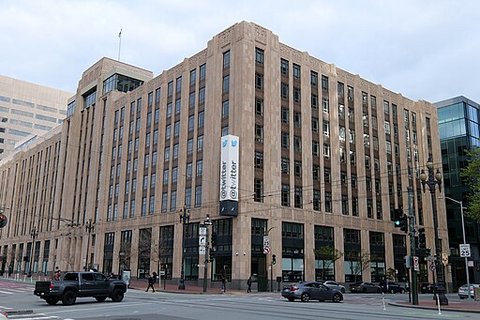
23 Oct Elon Musk ‘Singled Us Out’ With Lawsuit, Head of Anti-Hate Group Says

Headquarters of Twitter, now X Corp., in downtown San Francisco. (Filip Troníček, CC BY-SA 4.0, via Wikimedia Commons)
By Kathleen Quinn
The Center for Countering Digital Hate is fending off a lawsuit brought by X Corp., previously known as Twitter. The lawsuit alleges the organization “cherry-picked data” when it reported an uptick in hate speech on the social media platform. Furthermore, X claims the organization is attempting to “censor” opposing views.
Imran Ahmed, the chief executive of CCDH, said the lawsuit has created an opportunity to reach more people.
“Elon Musk has sort of singled us out. He has brought a lot of attention to our research and a lot of scrutiny of our research,” he said, referring to the owner, chair and chief technical officer of X Corp. “But I think it’s held up to that scrutiny.”
The lawsuit, filed in July, depicts CCDH and CCDH UK as “activist organizations masquerading as research agencies, funded and supported by unknown organizations, individuals and potentially even foreign governments with ties to legacy media companies.” X also accused CCDH of “actively working to prevent free expression.”
In contrast, Ahmed describes CCDH as “a research and advocacy organization that seeks to reduce the amount of hate and disinformation in online spaces.”
Ahmed said last month at the Eradicate Hate Global Summit that he started the center after a colleague was killed in 2016 by a far-right extremist who believed in the Great Replacement theory, a prominent motivator of hate online.
>>>Read: Third Annual Eradicate Hate Global Summit Takes Place
Indeed, Amy Spitalnick, CEO of the Jewish Council for Public Affairs, said at the summit, “Rising hate is coming alongside an increasing belief in conspiracy theories,” especially QAnon and the Great Replacement Theory.
It’s not just CCDH pointing to an increase in hateful content on the Musk-owned platform.
In a peer-reviewed study, “Auditing Elon Musk’s Impact on Hate Speech and Bots,” Keith Burghardt, a computer scientist at the Information Sciences Institute at the University of Southern California, showed that there has been a sharp upward trend in hate speech on Twitter.
“I don’t think that there was a dramatic policy change the first day [Musk] was on there, yet we do see a dramatic increase in hateful tweets the moment he buys Twitter,” Burghardt said. “So we are interpreting that as people are anticipating he would make policy changes that would make hate speech more easy to spread.”
Two days after Musk took the helm at Twitter on Oct. 27, 2022, he fired the head content moderator. A few days later came massive layoffs in areas related to inclusion and accessibility.
“When Elon Musk took over, he put up the bat signal, didn’t he?” Ahmed said. “He let back on thousands of people who’ve been suspended or banned.”
Imara Jones, a journalist and host of the show Translash Media, said that when Musk took over, it ushered in a sudden return of previously banned or suspended anti-trans accounts.
“It’s kind of an unregulated anti-trans cesspool,” Jones said. “People who are anti-trans, Christian nationalists — their voices are back in play. There is a ban on saying the word ‘cis,’ and people have been suspended as a result. So it’s night and day.”
>>>Commentary: The Internet Brings Out the Worst in Us
X said in a company blog post concerning the lawsuit, “Free expression and platform safety are not at odds. We are proving this every day through innovative enforcement policies that have helped reduce hateful content viewed on the platform.”
Burghardt, who has continued researching hate speech on the site, said it is still increasing, however. Particularly, he noted the “Bud Light controversy,” referring to swift backlash after a commercial aired featuring Dylan Mulvaney, a trans woman.
Shortly after Musk took over, Ahmed said there was a dramatic increase in hate speech.
“We found, for example, with the n-word, there was a 202% increase,” Ahmed said. “And across the board for anti-Jewish, anti-Black, anti-woman and anti-LGBTQ+.”
Elliot Malin, president of a government affairs group in Reno, Nevada, has reported accounts for antisemitic hate speech. He said though he has reported around 50 accounts over a few days, he only received three responses.
“My most recent one was an account called ‘gasthejews6969,’ ” Malin said. “There is a specific clause within the hateful conduct policy that prohibits the use of historically violent acts against a protected class. It specifically cites genocide and the Holocaust — and we all know where ‘gas the Jews’ comes from.”
Initially, his report was denied, saying the account had not violated the policy. The account has since been banned.
“What we found was that when we reported 100 bits of extreme hate produced by Twitter Blue accounts, 99 times out of 100, they failed to take down those posts in line with community guidelines,” Ahmed said.
Malin said he is very involved in the Jewish community in Nevada, and that has opened him up to antisemitic comments.
“I have had a few statements like ‘f the Jews,’ or ‘f you, Jew’ specifically sent to me,” Malin said.
Recently, CCDH tweeted about the increase in anti-Muslim hate in addition to antisemitism in relation to the ongoing violence in Gaza.
“Independent individuals, myself, CCDH, and the Institute for Strategic Dialogue, each have explored in their different methodologies, hateful tweets used on Twitter before and after Elon Musk bought it. And we’re seeing the same behavior,” Burghart said.
Jones said that Twitter was never perfect, but many people found community there and around the world.
“At least when things weren’t going off the rails, you had a person or a place to call,” Jones said. “That’s gone.”
>>>Read: Disabled Twitter Users Face Potential Loss of Community
Another claim in the lawsuit is that CCDH violated its terms of service by scraping data from Twitter using a third party to get the information for their reports. Musk changed the policy in April.
In March, Musk cut off access to Twitter’s free general API, a way of providing access to large amounts of tweets. In June, he further blocked access to what is known as “Academic Twitter API,” a way many researchers access massive datasets of up to 10 million tweets, according to Burghardt.
“Up until mid-June, we were still able to actually collect lots of tweets,” Burghardt said. “But after that, it was sort of silently blocked for everyone that I knew who had this academic API access within the span of a few days lost it, and that’s a huge problem.”
In Musk’s lawsuit, X Corp. claims CCDH is attempting to “censor” free speech by convincing advertisers to exit the platform and encouraging the ban of people who it says have differing viewpoints on issues like vaccines, abortion and climate change.
“There’s no reason for me to believe that the CCDH is trying to censor Twitter,” Burghardt said. “Nor do I believe that they’re acting in bad faith trying to misrepresent what tweets are appearing.”
Malin said that there is no First Amendment right to free speech on private property, which is what Twitter is.
“We know that the growth of Twitter is in all of the wrong places if you care about free and open dialogue that’s civil,” Jones said. “So I think what’s happening is that it’s dying a very slow death — Twitter will end not with a bang but with a whimper.”
Malin said Musk is banning left-wing and left-leaning accounts.
“If you’re going to be a free speech absolutist,” he said, “then you can’t be banning the press and people who are disagreeing with you.”
Jones said the allegation about censorship simply wasn’t logical.
“What (Musk) is doing across the board on that platform is totally irrational,” she said. “It just comes out of literally whatever fit he’s having at the moment.”
Musk’s lawyer was unreachable after multiple attempts to contact him over the phone and email. The press email for Twitter auto-responds with “Busy now, please check back later.”
The Center for Countering Digital Hate is using its website to raise money to defend against the lawsuit, which is still ongoing. It has almost reached its goal of raising $100,000.
“This is not just about CCDH,” Ahmed said. “This is about whether or not we can hold the richest in our society accountable.”
This resource is supported in whole or in part by funding provided by the State of California, administered by the California State Library in partnership with the California Department of Social Services and the California Commission on Asian and Pacific Islander American Affairs as part of the Stop the Hate program. To report a hate incident or hate crime and get support, go to CA vs Hate.





No Comments